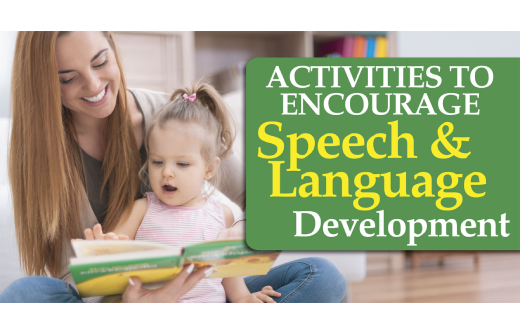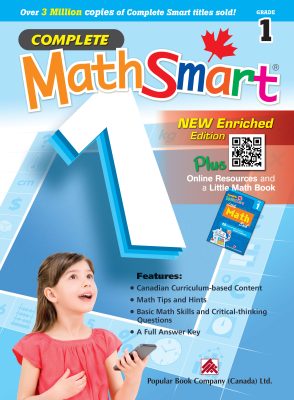The amount of words a child has in his or her vocabulary is directly correlated with the child’s success in school, and it comes as no surprise that children crave the attention and approval of their parents. There is research that shows that children who are spoken to more often develop better language skills than those who are not. However, it’s important to note that there is no correlation between quantity of speech during the early years and the development of good communication skills. In other words, it’s not how much a parent speaks to their child that is important; rather, it’s what they say when they speak. As long as parents encourage language development in everyday conversation from infancy through adolescence, their children will be well on their way to becoming successful adults.
Below are some activities to encourage Speech & Language Development:
1. Read books with your baby. Read to your baby like you’re telling a story even when the pictures do all the talking.
2. Teach your baby body parts and animal names through songs and sign language, such as: “Where is your nose? Here it is!” and “Nose, toes, fingers, and eyes.”
3. Introduce the concept of rhyming words by reading books that have rhyming words or singing rhymes together with your child. For example, you might sing the song “Heads Shoulders Knees an’ Toes” while touching each body part as you are naming it out loud together with your child .
4. Point to familiar objects in books, around the house, etc., so that your child can recognize these objects when you point to them.
5. When your child is learning words, label different items around the house together with your baby so that he/she will associate a word with an item instead of just hearing it without any associations.
6. Play games using action songs or nursery rhymes, such as “If You’re Happy and You Know It,” “Pat-a-Cake,” “The Wheels on the Bus,” etc. Have your baby join in whenever possible by clapping hands, stomping feet, or patting shoulders while singing along with you. These are all great ways to practice speech skills because they require interaction between you and your baby where who is saying what when is important.
7. Sing songs together with your child that are familiar at home or in daycare, such as “Where is Thumbkin” or “Itsy Bitsy Spider” . Encourage all family members to participate by singing along with you and dancing with their thumbs up whenever prompted by the song . It doesn’t matter that you or your child may not be able to sing well; it’s about making music together!
8. Play games like peekaboo, patty cake, etc., when putting your child down for naps or at night before bedtime or whenever he/she seems fussy or bored. Not only are these actions fun for babies, they also help them learn boundaries (e.g.: hands go over eyes during peekaboo so that no one can see), language (e.g.: patty cake), and how to wait for things they want while encouraging communication between different people .
9. When you are out in public with your baby and he/she starts getting fussy or bored, stop and observe the surroundings before rushing off to find a distraction. Sometimes all it takes is looking around to see what could be interesting for your child (e.g.: colors of leaves on trees or reflections in the water) before you find an activity that he/she will enjoy!
10. When your child looks at books with you, provide plenty of opportunities for him/her to look back and forth between pictures and words. For example, when reading a book about colors or animals, point to objects in the book while naming them aloud and have your child look at each picture while you name objects in the room of a matching color or animal. This not only reinforces language but also helps develop visual attention skills.
11. When your child points at something in his/her environment, use descriptive words to identify what he/she is looking at instead of simply repeating the name he/she used . For example, if your baby says “doggie” while pointing to a picture of a dog , say something like “oh wow…that looks like a doggie! Can you say ‘doggie?’ It’s called a doggie! Yes, that’s right! A doggie!” Not only does this help build vocabulary but it also shows him/her how to describe things more thoroughly by using two or more words when necessary.
12. Get out and about with your baby as much as you can, such as taking him/her to the park, library, or mall. Not only will this help build baby’s social skills and give mommy a break from cleaning up after baby, it is also a great opportunity for prolonged shared reading experiences where you can read books together at home before going somewhere and then talk to your baby about what you see while you’re there (and vice versa). The more words and knowledge children have of their environment before they enter formal education, the better! If possible, take pictures of whatever it is you go to so that your child can look back on them once he/she starts language development classes.
Talking with your baby is the first step to helping him/her develop language skills. You should talk to your baby as much as possible, but it doesn’t matter what you say; the most important thing that matters is that someone tells your child they love and care for them! Just by talking to your child and reading with them every day, you are already doing a great job at encouraging their language development. You can also help foster your child’s communication skills by trying some of the activities mentioned above. Even though it may be difficult to juggle all of these ideas, just try one or two (or even three!) and see what happens! That way, no matter how busy mommy and daddy are, they’ll still be able to play with their child and help encourage his/her language development skills.









